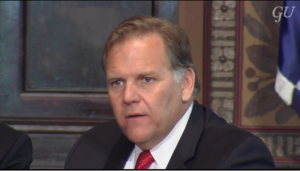James Clapper’s Letter DIDN’T Endorse S 2685; It Endorsed HR 3361
I’m sorry to return to James Clapper’s letter that has been grossly misreported as endorsing Patrick Leahy’s USA Freedom Act.
In this post I pointed out what Clapper’s letter really said. In this one, I described why it is so inexcusable that Clapper emphasized FBI’s exemption from reporting requirements (I will have a follow-up soon about why that earlier post just scratches the surface). And this post lays out some — but not all — the ways Clapper’s letter said he would gut the Advocate provision.
But I think there’s a far better way of understanding Clapper’s letter. He didn’t endorse Leahy’s USAF, S 2685. He endorsed USA Freedumber, HR 3361.
Below the rule I’ve put a summary of changes from USA Freedumber to Leahy USA Freedom, HR 3361 to S 2685. I did it a very long time ago, and there are things I’d emphasize differently now, but it will have to do for now (it may also be helpful to review this summary of how USA Freedumber made USA Freedumb worse). Basically, S 2685 improved on HR 3361 by,
- Tightening the definition of “specific selection term”
- Adding transparency (though, with exemptions for FBI reporting)
- Improving the advocate
- Limiting prospective CDR collection (but not retention and therefore probably dissemination) to counterterrorism
This closely matches what the coalition that signed onto S 2685 laid out as the improvements from HR 3361 to S 2685.
[T]he new version of the bill:
- Strengthens and clarifies the ban on “bulk” collection of records, including by tightening definitions to ensure that the government can’t collect records for everyone in a particular geographic area or using a particular communication service, and by adding new post-collection minimization procedures;
- Allows much more detailed transparency reporting by companies—and requires much more detailed transparency reporting by the government—about the NSA’s surveillance activities; and
- Provides stronger reforms to the secret Foreign Intelligence Surveillance Court’s processes, by creating new Special Advocates whose duty is to advocate to the court in favor of privacy and civil liberties, and by strengthening requirements that the government release redacted copies or summaries of the court’s significant decisions.
Though as I explained here, there is no public evidence the minimization procedures required by the bill are even as stringent as what the FISC currently imposes on most orders, so the minimization procedures of S 2685 might — like the emergency procedures do — actually weaken the status quo.
Here are three of the key passages from Clapper’s letter that I believe would address the intent of the bill as written.
- “Recognizing that the terms [laid out in the definition of specific selection term] enumerated in the statute may not always meet operational needs, the bill permits the use of other terms.”
- “The transparency provisions in this bill … recognize the technical limitations on our ability to report certain types of information.”
- “The appointment of an amicus in selected cases, as appropriate, need not interfere with important aspects of the FISA process, including the process of ex parte consultation between the Court and the government. We are also aware of the concerns that the Administrative Office of the U.S. Courts expressed in a recent letter, and we look forward to working with you and your colleagues to address those concerns.”
In other words, the limiting language in Clapper’s letter very clearly maps the changes from HR 3361 to S 2685.
He clearly says he doesn’t have to follow the new limits on specific selection terms. He signals he will use his authority to make classification and privilege determinations to keep information away from the amicus (or retain ex parte procedures via some other means). And by endorsing John Bates’ letter, he revealed his intention to take out requirements that the amicus advocate in favor of privacy and civil liberties. In addition — this is the part of Bates’ letter I missed in my previous analysis — he thereby endorsed Bates’ recommendation to “delet[e] this provision [specifying that the Court must release at least a summary], leaving in place the provision that significant FISA court decision would continue to be released, whenever feasible, in redacted form.”
Plus, as I mentioned, his use of “metadata” rather than “Call Detail Record” suggests he may play with that laudable limit in the bill as well.
I think Clapper’s read on the exemption for FBI is totally a fair reading of the bill; I just happen to think the Senate is doing a great deal of affirmative damage by accepting it. (Again, I hope to explain more why that is the case in the next day or so.)
Voila! Clapper’s “endorsement” of the bill managed to carve out almost all the improvements from HR 3361 to S 2685 (as well as emphasize Congress’ ratification for the FBI exemption, the huge reservation on the one improvement he left untouched). The only other improvement Clapper left in place was the limit on collection of prospective phone record to counterterrorism purposes.
That’s it. If Clapper’s views hold sway, that’s all this bill is: USA Freedumber with the retention of the status quo counterterrorism application for CDR collection.

